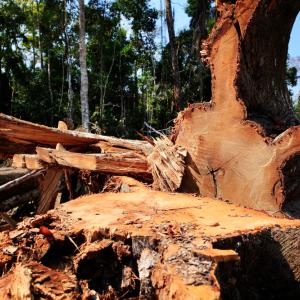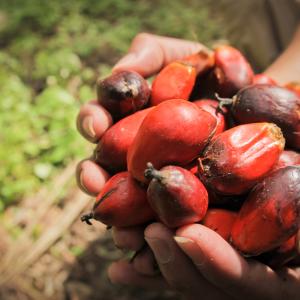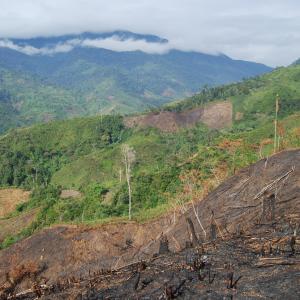19 February 2020
You are what you eat, but what feeds your food?
New WWF campaign reveals British bought produce has hidden costs
Shopping local and buying British should mean our food isn’t destroying natural habitats and killing the creatures that live there - but too often, that isn’t the case. WWF is aiming to change that with a campaign to make importing products that contain deforestation illegal, Let’s get deforestation #OffOurPlates.
The food we eat in the UK is linked to the threatened extinction of an estimated 33 species, including jaguars, giant anteaters and three-toed sloths. Agriculture accounts for nearly three quarters of deforestation in tropical and subtropical countries, and by 2030 a further 1,700,000 km2 of forests could be destroyed if current deforestation rates continue - meaning we will lose the fight against climate change.
WWF figures show that European consumers, including in the UK, eat approximately 61kg of soy a year without realising. For example, even if they’re born and reared in the UK, the majority of pigs and chickens are fed on soy which is grown abroad. The soy fed to animals that produce food mostly comes from South America, where soy production has nearly tripled in the last 20 years. Global production is predicted to double again by 2050.
Unsustainable soy production is responsible for the destruction of rainforests and natural habitats in South America, because it is currently more profitable to clear new land for food production than to use degraded or abandoned agricultural land that already exists.
For example, In Brazil’s Cerrado alone there are 40 million hectares of already cleared land that would be ideal for soy production. Instead, 50% of the Cerrado has already been destroyed.
The UK’s annual soy imports take up more than 1.5 million hectares of land, not including the footprint of the meat we import from other countries, and other products containing deforestation that we import.
While some companies have made commitments to tackle deforestation in their supply chains, voluntary action is not delivering the change needed. Instead, the UK Government must end the importing of products that are driving deforestation, with changes to the Environment Bill currently before Parliament to take deforestation out of supply chains and off our plates.
Katie White, WWF Executive Director of Advocacy and Campaigns, said: “People don’t want to eat food that’s destroying forests – but deforestation is hidden even in food that appears home-grown.
“Action by individual businesses or consumers isn’t enough. We need the UK Government to show decisive leadership to take deforestation off our plates with legislation that makes it illegal to import products that contribute to the destruction of forests.”
WWF is asking the UK public to join our Let's get deforestation #OffOurPlates campaign by finding out 5 ways to fight deforestation.
ENDS
NOTES TO EDITORS
Environment Bill
WWF is calling for a new chapter in the Environment Bill to address Britain’s ‘global footprint’ - the impact the things we consume here at home has on the environment overseas.
The new Global Footprint chapter should include:
- A target to reduce our global footprint
- A deforestation target and legal underpinning to ensure deforestation is out of our supply chains by the end of 2020
- A commitment to develop a full ‘Due Diligence’ obligation
The ambitious full ‘Due Diligence’ regulation would require UK companies to guarantee their activities and supply chains are not wrecking the planet, such as through deforestation or pollution.
Business would need to assess all goods they’re importing to ensure they are aware of and addressing negative impacts on people or wildlife. The obligation would provide business with the confidence to invest long-term in cleaning up supply chains. It will also level the playing field – driving action from less environmentally proactive businesses.
- Agriculture now covers more land than forests - accounting for over one-third of land area compared to forests which cover just under one-third.
- FAO (2016) State of the world's forests. Forests and agriculture: Land use challenges and opportunities. (12)
- Agriculture has accounted for 73% of deforestation in tropical and subtropical countries.
- FAO (2016) State of the world's forests. Forests and agriculture: Land use challenges and opportunities. (9)
- By 2030, a further 1,700,000 sq km of forest could be destroyed if current deforestation rates continue - that's an area 7 times the size of the UK.
- WWF (2012) WWFs Living Forests Report and https://www.wwf.org.uk/what-we-do/tackling-forest-loss-and-damage
- According to WWF’s Hidden Soy report, the average European consumer eats 18.6kg of chicken a year, but that chicken meat takes 20.3kg of soy to produce.
 Our 10 myths about deforestation
Our 10 myths about deforestation
 8 things to know about palm oil
8 things to know about palm oil
 5 ways to stop deforestation in our food
5 ways to stop deforestation in our food
 Our Selection of Healthy Sustainable Recipes
Our Selection of Healthy Sustainable Recipes